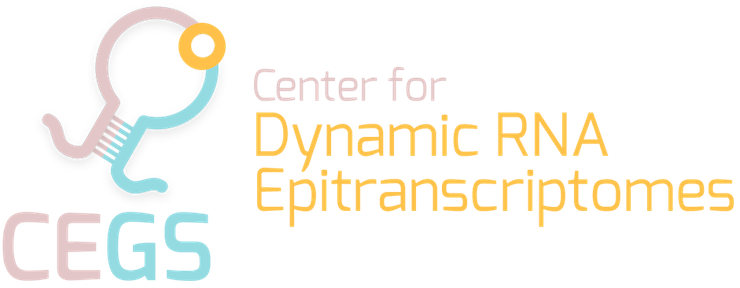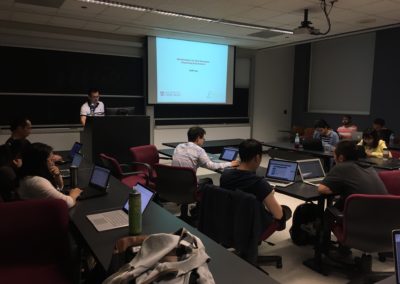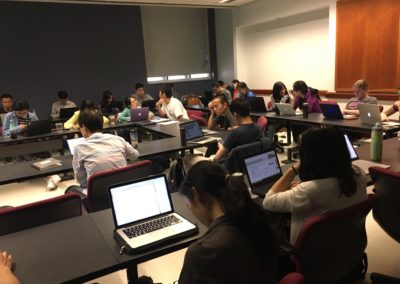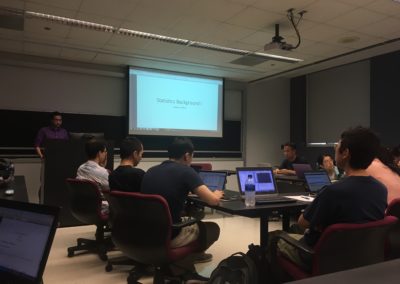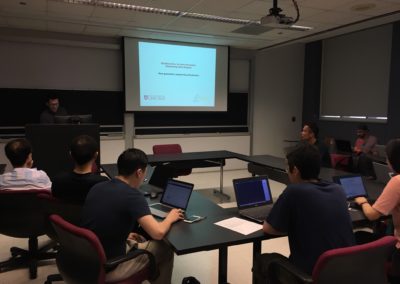Outreach
January 2020
Now in Twitter: CDRE@CDRE_CEGS
We have developed RADAR, a comprehensive analytical tool for detecting differentially methylated loci in MeRIP-seq data.
June 2018
The course “Bioinformatics for Next Generation Sequencing Data Analysis” took place on June on 19-20 at University of Chicago.
Lectures: We offered 8 lectures, each 1 hour 15 min. The lectures were mixed with real world examples for students to gain hands-on experience. The specific topics of each lecture are listed below.
1. Introduction: NGS technologies, Linux background, basics of data analysis with R.
2. Statistics background: explorative data analysis, hypothesis testing, multiple testing correction, linear regression and Generalized Linear Model (GLM). Theory will be mixed with examples in R.
3. NGS analysis workflow: QC and preprocessing, short read alignment, common NGS data format, data visualization, SAM/BAM tools.
4. RNA-seq: RNA-seq experiments, RNA-seq read alignment, quantifying and estimation of gene expression level, testing differential expression.
5. Analysis of transcriptome data: Principal Component Analysis (PCA), clustering of expression data, gene pathway and network analysis (GSEA, Ingenuity), co-expression networks.
6. Sequence analysis and epigneomics: sequence alignment, motif analysis, Hidden Markov Model (HMM), epigenomics background, studies of functional non-coding elements.
7. DNA-seq: genetic variations and their role in human diseases, calling genotypes in a single genome, call genotypes in multiple samples (GATK), variant annotation tools (Annovar).
8. M6A-seq: background of epitranscriptomics, M6A-seq experiment and data analysis.
Instructors: Dr. Yuwen Liu (YL) from Department of Human Genetics and Dr. Qili Fei (QF) from Department of Chemistry. Dr. Siming Zhao (SZ) from Human Genetics will give one lecture on variant calling, and Dr. Shun Liu (SL) from Dep. of Chemistry will give a lecture on M6A-seq data analysis.
Course director: Prof. Xin He from Department of Human Genetics.
JANUARY 2018
CDRE has awarded one grant for a pilot innovative study in the field of RNA modifications.
Professor Yu-Ying He, Department of Medicine, University of Chicago, for:
“The role of m6A eraser FTO in melanoma“.
JUNE 2017
The course “Bioinformatics for Next Generation Sequencing Data Analysis” took place June on 19-20 at University of Chicago.
Objectives: In this short course, we introduced to students the basic statistics and bioinformatics concepts and tools for analysis of NGS data, such as RNA-seq and ChIP-seq data. The course had three objectives.
- Learn basic computational and statistical machineries such as Generalized Linear Model.
- Understand the basic concepts and principles for analyzing DNA-seq, RNA-seq, and ChIP-seq data.
- Gain hands-on experience with popular software for NGS data analysis.
Instructors: Dr. Yuwen Liu from Department of Human Genetics and Dr. Qili Fei from Department of Chemistry. Both Dr. Liu and Fei have many years of experience in bioinformatics and computational biology.
Course director: Prof. Xin He from Department of Human Genetics.
FEBRUARY 2017
CDRE has awarded two grants for pilot innovative studies in the field of RNA modifications:
1) Professor Xiaoxi Zhuang, Department of Neurobiology, University of Chicago, for:
“Role of m6A in local protein synthesis in dendrites and aberrant synaptic plasticity“.
2) Professor Jingy Fei, Department of Biochemistry And Molecular Biology, University of Chicago, for:
“Deep imaging of the epitransciptome: deciphering the next layer of gene regulation“.
